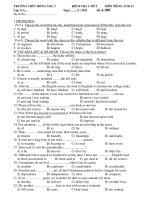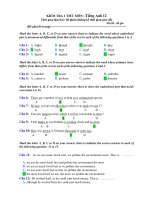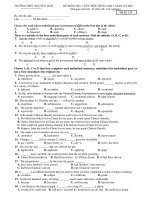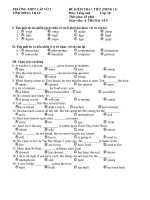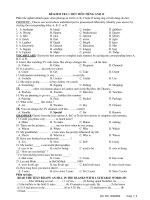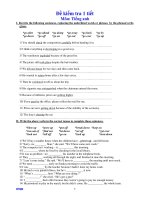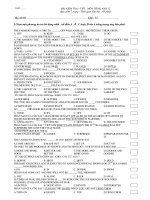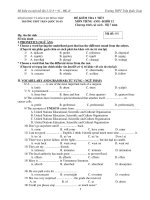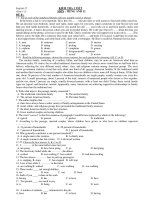ĐỀ KIỂM TRA 1 TIẾT MÔN TIẾNG ANH 12 BAN XÃ HỘI - Mã đề: 138 pdf
Bạn đang xem bản rút gọn của tài liệu. Xem và tải ngay bản đầy đủ của tài liệu tại đây (164.15 KB, 7 trang )
TRƯỜNG THPT NGUYỄN TRÃI
ĐỀ KIỂM TRA 1 TIẾT MÔN TIẾNG ANH 12 BAN XÃ HỘI
Thời gian làm bài :45 phút (40 trắc nghiệm)
Mã đề: 138
Họ, tên thí sinh
Lớp. Số báo danh
Choose the word whose underlined part is pronounced differently from that of the others.
1. A. achieve B. chemistry C. chores D. each
2. A. financial B. mate C. affidavit D. stage
There is a mistake in the four underlined parts of each sentence. Find the mistake (A, B, C, or D).
3. Anyone whose works is regarded as a useful member of our society.
A B C D
4. We all know that we have to work hardly to earn a living ourselves and support the family.
A B C D
5. If everyone can fly, how could we control air traffic?
A B C D
6. The national curriculum is set by the government and must follow in all state school.
A B C D
Choose A, B, C or D that best completes each unfinished sentences, substitutes the underlined part, or
has a close meaning to the original one.
7. Please put the book ________ you have taken it.
A. whichever B. where C. anywhere D. wherever
8. A university is an -institution of higher education and research, which grants _______ degrees at all levels
in a variety of subjects.
A. optional B. secondary C. academic D. vocational
9. In July, most students in Vietnam take the National Entrance Examinations to enter higher education institutions.
A. universities B. language schools C. vacational schools D. high schools
10. The deadline is 1 October and late will not be marked.
A. receptions B. submissions C. suggestions D. admissions
11. The parents had been _______ warned about their son’s misbehavior.
A. expectedly B. markedly C. allegedly D. repeatedly
12. John speaks Chinese fluently because he used to live in China for ten years.
A. Provided that John lived in China for ten years, he could speak Chinese fluently.
B. Unless John had lived in China for ten years, he could not have spoken Chinese fluently.
C. John could not speak Chinese fluently if he had not lived in China for ten years.
D. Suppose John has lived in China for ten years, he can speak Chinese fluently.
13. She made a lot of mistakes because she was______.
A. contented B. inattentive C. flexible D. inconvenient
14. Oranges ______ rich in vitamin C, which ______ good for our health.
A. are / will be B. have been / is C. are / is D. were / has been
15. He was the only _______ that was offered the job.
A. application B. applicant C. applying D. apply
16. _______ more carefully, he would not have had the accident yesterday.
A. Unless Peter had driven B. Had Peter driven C. If Peter driven D. If had Peter driven
17. The preparations _______ by the time the guests _______.
A. have been finished / were arrived B. had finished / were arriving
C. had been finished / arrived D. have finished / arrived
18. A _______is an official document that you receive when you have completed a course of study or training.
A. vocation B. subject C. certificate D. grade
19. In the last hundred years, traveling _______ much easier and more comfortable.
A. became B. becomes C. will become D. has become
20. I am flying to the States tonight. I ______ you a ring if I ________ a phone.
A. would give/ could find B. will give / can find C. would have given/ find D. could give/ found
21. I very much like working with machine, so I shall apply ___ the school of Mechanical Engineering at the
University of Technology.
A. with B. for C. about D. to
22. Beethoven's Fifth Symphony _______ next weekend.
A. will have performed B. will be performing C. has been performed D. is going to be performed
23. A good education will help you to succeed_____ passing an exam.
A. at B. with C. about D. in
24. John _______ a respectful and obedient student.
A. is said B. said to be C. is said being D. is said to be
25. It was your assistance that enabled us to get achievement.
A. If you assisted us, we could not get achievement.
B. Your assistance discouraged us from get achievement.
C. Without your assistance, we could get achievement.
D. But for your assistance, we could not have got achievement.
26. They _______ time and money doing such a thing.
A. were advised not to be wasted B. were advising not to waste
C. were advised not to waste D. were advising not to be wasted
27. The cyclone has resulted _________ destruction and flood.
A. for B. in C. with D. on
Read the following passage and choose the best answer (A, B, C or D) for each blank.
There are two parallel school (28) in England. The first is the (29) school system, which is
free for all students and paid for by the state. The second category is the (30) or “public” school
system, which is free paying. The state school system, which (31) 93% of the pupils in England can
be divided (32) two levels of education. (33) education and secondary education.
28. A. systems B. years C. stages D. levels
29. A. independence B. government C. country D. state
30. A. independence B. independent C. depend D. dependent
31. A. educating B. educates C. educate D. educated
32. A. into B. from C. with D. for
33. A. childcare B. compulsory C. primary D. high
Read the passage below and choose one correct answer for each question.
In 1988, for the first time in British history, a National Curriculum was introduced. The National
Curriculum tells pupils which subjects they have to study, what they must learn and when they have to take
assessment tests.
Between the ages of 14 and 16, pupils study for their GCSE (General Certificate of Secondary
Education) exams. Pupils must take English language, Maths and Science for GCSE, as well as a half GCSE
in a foreign language and Technology. In addition, they must also be taught Physical Education, Religious
Education and Sex Education, although they do not take exams in these subjects.
At the age of 16, pupils can leave school. If pupils stay on, they usually take A (Advanced) levels, AS
(Advanced Supplementary) level or GNVQs (Greater National Vocational Qualifications). It is quite common
to combine, for example, two A levels with one AS level, or one A level with one GNVQ.
Pupils taking A levels study traditional subjects, such as French, Physics or History. To go to
university, pupils usually need two or three A levels.
34. Britain began to have a National Curriculum ………………… .
A. one hundred years ago B. in the nineteenth century C. in 1898 D. in 1988
35. Which of the following subjects don’t British students take the exam in?
A. Science B. Maths C. English Language D. Physical Education
36. Pupils need A levels to continue their study at university.
A. two or three B. four or five C. one or two D. five or six
37. Pupils normally study for their GCSE between the ages of .
A. 16 and 18 B. 15 and 17 C. 14 and 16 D. 12 and 14
Choose a word that has the different stress from the rest
38. A. community B. procedure C. application D. technology
39. A. July B. language C. subject D. gateway
40. A. certificate B. requirement C. previous D. addition
TRƯỜNG THPT NGUYỄN TRÃI
ĐỀ KIỂM TRA 1 TIẾT MÔN TIẾNG ANH 12 BAN XÃ HỘI
Thời gian làm bài .45 phút (40 trắc nghiệm)
Mã đề: 138
Họ, tên thí sinh
Lớp. Số báo danh
Choose the word whose underlined part is pronounced differently from that of the others.
1. A. achieve B. chemistry C. chores D. each
2. A. financial B. mate C. affidavit D. stage
There is a mistake in the four underlined parts of each sentence. Find the mistake (A, B, C, or D).
3. Anyone whose works is regarded as a useful member of our society.
A B C D
4. We all know that we have to work hardly to earn a living ourselves and support the family.
A B C D
5. If everyone can fly, how could we control air traffic?
A B C D
6. The national curriculum is set by the government and must follow in all state school.
A B C D
Choose A, B, C or D that best completes each unfinished sentences, substitutes the underlined part, or
has a close meaning to the original one.
7. Please put the book ________ you have taken it.
A. whichever B. where C. anywhere D. wherever
8. A university is an -institution of higher education and research, which grants _______ degrees at all levels
in a variety of subjects.
A. optional B. secondary C. academic D. vocational
9. In July, most students in Vietnam take the National Entrance Examinations to enter higher education institutions.
A. universities B. language schools C. vacational schools D. high schools
10. The deadline is 1 October and late will not be marked.
A. receptions B. submissions C. suggestions D. admissions
11. The parents had been _______ warned about their son’s misbehavior.
A. expectedly B. markedly C. allegedly D. repeatedly
12. John speaks Chinese fluently because he used to live in China for ten years.
A. Provided that John lived in China for ten years, he could speak Chinese fluently.
B. Unless John had lived in China for ten years, he could not have spoken Chinese fluently.
C. John could not speak Chinese fluently if he had not lived in China for ten years.
D. Suppose John has lived in China for ten years, he can speak Chinese fluently.
13. She made a lot of mistakes because she was______.
A. contented B. inattentive C. flexible D. inconvenient
14. Oranges ______ rich in vitamin C, which ______ good for our health.
A. are / will be B. have been / is C. are / is D. were / has been
15. He was the only _______ that was offered the job.
A. application B. applicant C. applying D. apply
16. _______ more carefully, he would not have had the accident yesterday.
A. Unless Peter had driven B. Had Peter driven C. If Peter driven D. If had Peter driven
17. The preparations _______ by the time the guests _______.
A. have been finished / were arrived B. had finished / were arriving
C. had been finished / arrived D. have finished / arrived
18. A _______is an official document that you receive when you have completed a course of study or training.
A. vocation B. subject C. certificate D. grade
19. In the last hundred years, traveling _______ much easier and more comfortable.
A. became B. becomes C. will become D. has become
20. I am flying to the States tonight. I ______ you a ring if I ________ a phone.
A. would give/ could find B. will give / can find C. would have given/ find D. could give/ found
21. I very much like working with machine, so I shall apply ___ the school of Mechanical Engineering at the
University of Technology.
A. with B. for C. about D. to
22. Beethoven's Fifth Symphony _______ next weekend.
A. will have performed B. will be performing C. has been performed D. is going to be performed
23. A good education will help you to succeed_____ passing an exam.
A. at B. with C. about D. in
24. John _______ a respectful and obedient student.
A. is said B. said to be C. is said being D. is said to be
25. It was your assistance that enabled us to get achievement.
A. If you assisted us, we could not get achievement.
B. Your assistance discouraged us from get achievement.
C. Without your assistance, we could get achievement.
D. But for you assistance, we could not have got achievement.
26. They _______ time and money doing such a thing.
A. were advised not to be wasted B. were advising not to waste
C. were advised not to waste D. were advising not to be wasted
27. The cyclone has resulted _________ destruction and flood.
A. for B. in C. with D. on
Read the following passage and choose the best answer (A, B, C or D) for each blank.
There are two parallel school (28) in England. The first is the (29) school system, which is
free for all students and paid for by the state. The second category is the (30) or “public” school
system, which is free paying. The state school system, which (31) 93% of the pupils in England can
be divided (32) two levels of education. (33) education and secondary education.
28. A. systems B. years C. stages D. levels
29. A. independence B. government C. country D. state
30. A. independence B. independent C. depend D. dependent
31. A. educating B. educates C. educate D. educated
32. A. into B. from C. with D. for
33. A. childcare B. compulsory C. primary D. high
Read the passage below and choose one correct answer for each question.
In 1988, for the first time in British history, a National Curriculum was introduced. The National
Curriculum tells pupils which subjects they have to study, what they must learn and when they have to take
assessment tests.
Between the ages of 14 and 16, pupils study for their GCSE (General Certificate of Secondary
Education) exams. Pupils must take English language, Maths and Science for GCSE, as well as a half GCSE
in a foreign language and Technology. In addition, they must also be taught Physical Education, Religious
Education and Sex Education, although they do not take exams in these subjects.
At the age of 16, pupils can leave school. If pupils stay on, they usually take A (Advanced) levels, AS
(Advanced Supplementary) level or GNVQs (Greater National Vocational Qualifications). It is quite common
to combine, for example, two A levels with one AS level, or one A level with one GNVQ.
Pupils taking A levels study traditional subjects, such as French, Physics or History. To go to
university, pupils usually need two or three A levels.
34. Britain began to have a National Curriculum ………………… .
A. one hundred years ago B. in the nineteenth century C. in 1898 D. in 1988
35. Which of the following subjects don’t British students take the exam in?
A. Science B. Maths C. English Language D. Physical Education
36. Pupils need A levels to continue their study at university.
A. two or three B. four or five C. one or two D. five or six
37. Pupils normally study for their GCSE between the ages of .
A. 16 and 18 B. 15 and 17 C. 14 and 16 D. 12 and 14
Choose a word that has the different stress from the rest 38 đến 40.
38. A. community B. procedure C. application D. technology
39. A. July B. language C. subject D. gateway
40. A. certificate B. requirement C. previous D. addition
TRƯỜNG THPT NGUYỄN TRÃI
ĐỀ KIỂM TRA 1 TIẾT MÔN TIẾNG ANH 12 BAN XÃ HỘI
Thời gian làm bài .45 phút (40 trắc nghiệm)
Mã đề: 138
Họ, tên thí sinh
Lớp. Số báo danh
Choose the word whose underlined part is pronounced differently from that of the others.
1. A. achieve B. chemistry C. chores D. each
2. A. financial B. mate C. affidavit D. stage
There is a mistake in the four underlined parts of each sentence. Find the mistake (A, B, C, or D).
3. Anyone whose works is regarded as a useful member of our society.
A B C D
4. We all know that we have to work hardly to earn a living ourselves and support the family.
A B C D
5. If everyone can fly, how could we control air traffic?
A B C D
6. The national curriculum is set by the government and must follow in all state school.
A B C D
Choose A, B, C or D that best completes each unfinished sentences, substitutes the underlined part, or
has a close meaning to the original one.
7. Please put the book ________ you have taken it.
A. whichever B. where C. anywhere D. wherever
8. A university is an -institution of higher education and research, which grants _______ degrees at all levels
in a variety of subjects.
A. optional B. secondary C. academic D. vocational
9. In July, most students in Vietnam take the National Entrance Examinations to enter higher education institutions.
A. universities B. language schools C. vacational schools D. high schools
10. The deadline is 1 October and late will not be marked.
A. receptions B. submissions C. suggestions D. admissions
11. The parents had been _______ warned about their son’s misbehavior.
A. expectedly B. markedly C. allegedly D. repeatedly
12. John speaks Chinese fluently because he used to live in China for ten years.
A. Provided that John lived in China for ten years, he could speak Chinese fluently.
B. Unless John had lived in China for ten years, he could not have spoken Chinese fluently.
C. John could not speak Chinese fluently if he had not lived in China for ten years.
D. Suppose John has lived in China for ten years, he can speak Chinese fluently.
13. She made a lot of mistakes because she was______.
A. contented B. inattentive C. flexible D. inconvenient
14. Oranges ______ rich in vitamin C, which ______ good for our health.
A. are / will be B. have been / is C. are / is D. were / has been
15. He was the only _______ that was offered the job.
A. application B. applicant C. applying D. apply
16. _______ more carefully, he would not have had the accident yesterday.
A. Unless Peter had driven B. Had Peter driven C. If Peter driven D. If had Peter driven
17. The preparations _______ by the time the guests _______.
A. have been finished / were arrived B. had finished / were arriving
C. had been finished / arrived D. have finished / arrived
18. A _______is an official document that you receive when you have completed a course of study or training.
A. vocation B. subject C. certificate D. grade
19. In the last hundred years, traveling _______ much easier and more comfortable.
A. became B. becomes C. will become D. has become
20. I am flying to the States tonight. I ______ you a ring if I ________ a phone.
A. would give/ could find B. will give / can find C. would have given/ find D. could give/ found
21. I very much like working with machine, so I shall apply ___ the school of Mechanical Engineering at the
University of Technology.
A. with B. for C. about D. to
22. Beethoven's Fifth Symphony _______ next weekend.
A. will have performed B. will be performing C. has been performed D. is going to be performed
23. A good education will help you to succeed_____ passing an exam.
A. at B. with C. about D. in
24. John _______ a respectful and obedient student.
A. is said B. said to be C. is said being D. is said to be
25. It was your assistance that enabled us to get achievement.
A. If you assisted us, we could not get achievement.
B. Your assistance discouraged us from get achievement.
C. Without your assistance, we could get achievement.
D. But for you assistance, we could not have got achievement.
26. They _______ time and money doing such a thing.
A. were advised not to be wasted B. were advising not to waste
C. were advised not to waste D. were advising not to be wasted
27. The cyclone has resulted _________ destruction and flood.
A. for B. in C. with D. on
Read the following passage and choose the best answer (A, B, C or D) for each blank.
There are two parallel school (28) in England. The first is the (29) school system, which is
free for all students and paid for by the state. The second category is the (30) or “public” school
system, which is free paying. The state school system, which (31) 93% of the pupils in England can
be divided (32) two levels of education. (33) education and secondary education.
28. A. systems B. years C. stages D. levels
29. A. independence B. government C. country D. state
30. A. independence B. independent C. depend D. dependent
31. A. educating B. educates C. educate D. educated
32. A. into B. from C. with D. for
33. A. childcare B. compulsory C. primary D. high
Read the passage below and choose one correct answer for each question.
In 1988, for the first time in British history, a National Curriculum was introduced. The National
Curriculum tells pupils which subjects they have to study, what they must learn and when they have to take
assessment tests.
Between the ages of 14 and 16, pupils study for their GCSE (General Certificate of Secondary
Education) exams. Pupils must take English language, Maths and Science for GCSE, as well as a half GCSE
in a foreign language and Technology. In addition, they must also be taught Physical Education, Religious
Education and Sex Education, although they do not take exams in these subjects.
At the age of 16, pupils can leave school. If pupils stay on, they usually take A (Advanced) levels, AS
(Advanced Supplementary) level or GNVQs (Greater National Vocational Qualifications). It is quite common
to combine, for example, two A levels with one AS level, or one A level with one GNVQ.
Pupils taking A levels study traditional subjects, such as French, Physics or History. To go to
university, pupils usually need two or three A levels.
34. Britain began to have a National Curriculum ………………… .
A. one hundred years ago B. in the nineteenth century C. in 1898 D. in 1988
35. Which of the following subjects don’t British students take the exam in?
A. Science B. Maths C. English Language D. Physical Education
36. Pupils need A levels to continue their study at university.
A. two or three B. four or five C. one or two D. five or six
37. Pupils normally study for their GCSE between the ages of .
A. 16 and 18 B. 15 and 17 C. 14 and 16 D. 12 and 14
Choose a word that has the different stress from the rest 38 đến 40.
38. A. community B. procedure C. application D. technology
39. A. July B. language C. subject D. gateway
40. A. certificate B. requirement C. previous D. addition
